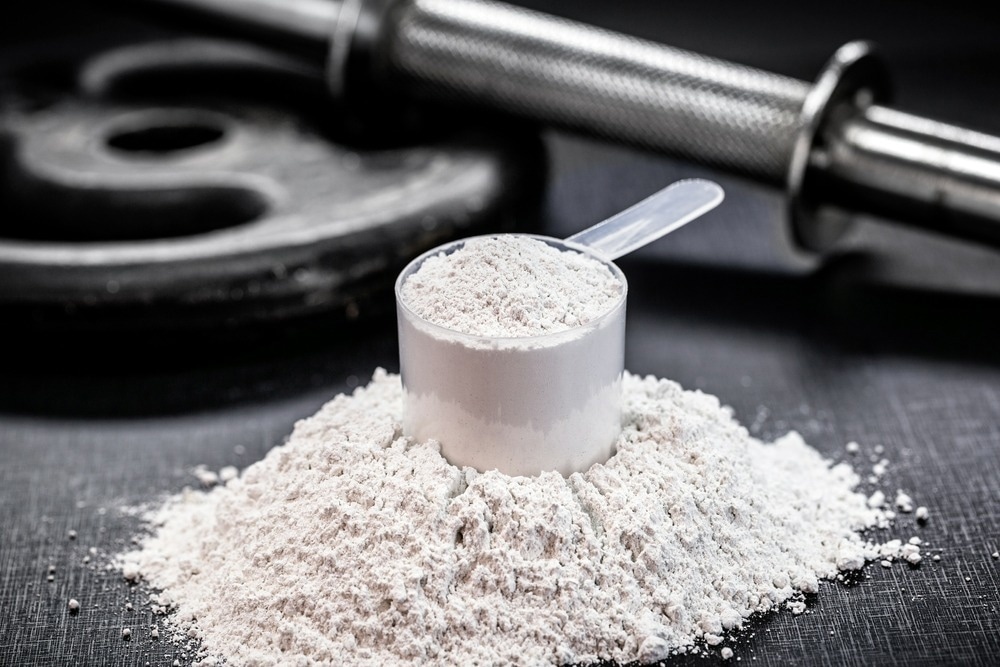
Could creatine supplementation be the answer to post-COVID-19 fatigue?
In a recent study published in the journal Food Science & Nutrition, researchers investigated creatine supplementations as a potential intervention strategy to attenuate the clinical symptoms of post-coronavirus disease 2019 (COVID-19) fatigue syndrome. They used a placebo-controlled, double-anonymized methodology to evaluate the outcomes of creatine supplementation on adults who recently suffered from COVID-19.

Their results suggest that 4 g of creatine consumed daily for six months significantly improves tissue bioenergetics and rescues patients from the clinical symptoms of fatigue syndrome. Researchers were able to find substantial improvements in fatigue and common fatigue-related symptoms as early as three months into treatment, making the case for creatine as an easily accessible intervention in restoring the quality of life of patients suffering from severe acute respiratory syndrome coronavirus 2 (SARS-CoV-2) induced post-viral fatigue syndrome (PVFS).
COVID-19 and PVFS
The coronavirus disease 2019 (COVID-19) pandemic is one of the worst pandemics in recorded history, with the World Health Organization (WHO) recording more than 761 million cases and almost 7 million deaths.
Despite a large number of patients recovering from the disease, a large proportion of patients retain symptoms, including anosmia (the loss of the ability to detect smells), ageusia (the loss of the sense of taste), lung pain, breathing difficulties, body aches, concentration reductions, and persistent headaches for as long as six months following infection recovery.
Approximately 45% of COVID-19 patients also suffer from post-exertional malaise (discomfort or illness), sleep disorders, and general fatigue, typical symptoms of post-viral fatigue syndrome (PVFS). PVFS, also called myalgic encephalomyelitis or chronic fatigue syndrome, is a poorly understood, long-term neurological condition characterized by an individual's inability to carry out routine activities before a severe viral infection efficiently.
While the etiology of the condition remains unexplored, several studies have established the alarmingly high prevalence of PVFS in patients following severe acute respiratory syndrome coronavirus 2 (SARS-CoV-2) recovery.
Recently, dietary creatine supplementation has been suggested as a safe and cost-effective intervention to rescue patients from COVID-19-induced PVFS, especially since normal creatine metabolism- and retention disruptions usually accompany PVFS.
"In particular, creatine can help individuals cope with PVFS through several means, including the facilitation of cellular bioenergetics, glutamatergic modulation, neuroprotection, antioxidant activity, and inflammation suppression, domains often compromised in syndromes with chronic fatigue."
A recent study reported reduced creatine levels in the bodily tissue of patients suffering from post-COVID-19 fatigue syndrome. While this implied a need for exogenous supplementation of creatine, no studies thus far have explored the outcomes of creatine supplementation on individuals presenting post-COVID-19 fatigue symptoms in the clinical context.
About the study
In the present study, researchers hypothesized that creatine supplementation may present an effective and safe intervention in rehabilitating patients suffering from post-COVID-19 fatigue syndrome.
They employed a parallel-group, randomized, placebo-controlled, double-blind study design wherein 12 participants were divided into a creatine-supplemented case cohort and a placebo-control cohort, respectively.
All participants were adults between the ages of 18-65 years, were clinically confirmed COVID-19-positive within the preceding three months before study initiation, and presented at least one COVID-19-related symptom following infection recovery (breathing difficulties, lung pain, anosmia, ageusia, body aches, headaches, or concentration difficulties). Notably, all participants reported moderate-to-severe fatigue following COVID-19 recovery, depicted as Multidimensional Fatigue Inventory (MFI-20) scores of 43.5 or higher.
The case- and control cohorts were randomly assigned, but care was taken to match their baseline demographics as closely as possible (sex, age, weight, height, and body mass index [BMI]). The case cohorts were administered 4 g of creatine monohydrate daily, while the control cohort received an equal amount of inulin. The interventions lasted six months, during which time participants were required not to consume any other dietary supplement or alter their routine nutritional practices.
Outcome measurements were recorded at study initiation (baseline), after three months, and after six months of the intervention. Outcome measurements comprised five dimensions of fatigue, patient-reported outcomes, tissue levels of creatine, walking time to exhaustion (clinical exercise tolerance), and side effects prevalence (and, if relevant, severity).
Fatigue measurements were recorded complying with the MFI-20 test, with the five dimensions evaluated comprising general fatigue, physical fatigue, reduced activity, reduced motivation, and mental fatigue. Proton magnetic resonance spectroscopy (MRI) was used to measure creatine levels in patients' tissues. Visual analog scale (VAS) scores were used to evaluate the severity of COVID-19-related symptoms (anosmia, ageusia, breathing difficulties, etc.). A motorized treadmill was used to verify time-to-exhaustion clinically. Side effects were self-reported by participants, wherever relevant.
Statistical analyses included distribution normality testing using the Shapiro–Wilk test and variance homogeneity testing using Bartlett's test. Time versus intervention interaction effects were evaluated using a two-way analysis of variance (ANOVA) for homogenous variances and Friedmann's test for nonhomogeneous variances. Cohen's statistics were employed to estimate effect sizes.
Study findings
Analyses of results revealed that tissue creatine levels in the right parietal white matter and the vastus medialis muscle increased significantly in case participants compared to controls at both the 3- and 6-month evaluations. Controls showed no increases in tissue creatine levels compared to baseline readings. The case group showed significant reductions in fatigue levels after three months of creatine intake. In contrast, the placebo group showed worsening motivation levels at the same time period.
Time to exhaustion and VAS scores significantly improved in the case group after six months of creatine dietary supplementation. Notably, body aches and headaches were reduced for the case group after 3- and 6-months of creatine use, respectively. Overall, all interaction effects showed significant reductions in the case group by the end of the study period.
Analyses of results from Cohen's effect size results depicted that creatine was associated with increased brain levels in the thalamus, right frontal white matter, right paracentral gray matter, left parietal white matter, parietal white matter, left parietal mesial gray matter, and right parietal mesial gray matter. Similarly, creatine consumption resulted in improvements in mental fatigue levels and holistic reductions in symptoms of post-COVID-19 fatigue syndrome.
Of the six patients in the case group, only one reported mild transient nausea as a side effect.
Conclusions
The present study explored the outcomes of creatine as a dietary supplementation intervention in rehabilitating patients who had recovered from COVID-19 but who experienced symptoms of PVFS. Their results suggest that creatine holistically improves body condition and brain activity and reduces the effects of post-COVID-19 fatigue syndrome. This implies that creatine can be used as a safe, inexpensive, and easily accessible intervention in COVID-19-associated PVFS.
The major limitation of this study was its small sample size. Further research with larger sample cohorts may help establish creatine supplementation as a regular treatment for both post-COVID-19 fatigue syndrome and PVFS.
- Slankamenac, J., Ranisavljev, M., Todorovic, N., Ostojic, J., Stajer, V. and Ostojic, S. M. (2023) Food Science & Nutrition. doi: 10.1002/fsn3.3597. https://onlinelibrary.wiley.com/doi/10.1002/fsn3.3597
Posted in: Medical Science News | Medical Research News | Disease/Infection News
Tags: Anosmia, Antioxidant, Body Mass Index, Brain, Breathing, Chronic, Chronic Fatigue Syndrome, Coronavirus, Coronavirus Disease COVID-19, covid-19, Creatine, Encephalomyelitis, Exercise, Exhaustion, Fatigue, Food, Inflammation, Metabolism, Muscle, Myalgic Encephalomyelitis, Nausea, Nutrition, Pain, Pandemic, Placebo, Research, Respiratory, SARS, SARS-CoV-2, Severe Acute Respiratory, Severe Acute Respiratory Syndrome, Sleep, Spectroscopy, Syndrome, Thalamus, Walking

Written by
Hugo Francisco de Souza
Hugo Francisco de Souza is a scientific writer based in Bangalore, Karnataka, India. His academic passions lie in biogeography, evolutionary biology, and herpetology. He is currently pursuing his Ph.D. from the Centre for Ecological Sciences, Indian Institute of Science, where he studies the origins, dispersal, and speciation of wetland-associated snakes. Hugo has received, amongst others, the DST-INSPIRE fellowship for his doctoral research and the Gold Medal from Pondicherry University for academic excellence during his Masters. His research has been published in high-impact peer-reviewed journals, including PLOS Neglected Tropical Diseases and Systematic Biology. When not working or writing, Hugo can be found consuming copious amounts of anime and manga, composing and making music with his bass guitar, shredding trails on his MTB, playing video games (he prefers the term ‘gaming’), or tinkering with all things tech.